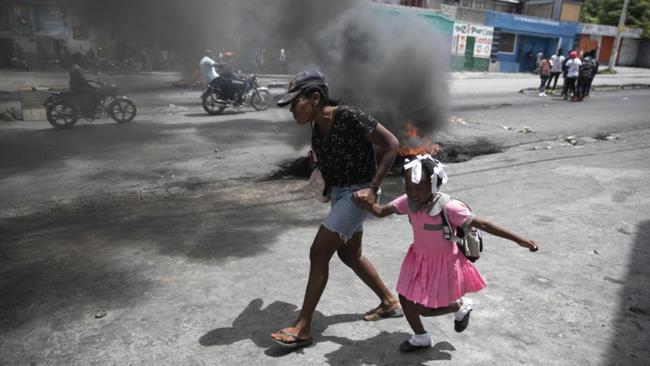In recent months, acts of violence in the country has increasingly being targeting professionals, especially those in the health sector. Toward addressing these developments, the Haitian Medical Association L’Association médicale haïtienne (AMH) and the association of Haitian Specialists, l’Association médicale spécialisée (AMS) on Monday, May 23, 2022, organized a press conference to denounce the state of affairs and the effect the increasing insecurity is having on their professional practice. Dr. Carole Cadet Day, President of AMH, stated at this second press conference, within the past two months, that is a call for help by their professional body, which is now questioning whether the insecurity issues their members face is simply a coincidence or a targeted approach by the bandits. Acknowledging that these medical organizations did not want to draw hasty conclusions, there are facts that cannot be ignored. For instance, doctors have been kidnapped responding to calls from patients in distress, and this disturbing trend brings to question the doctors’ ethical obligations as their call to attend to patients in need is tempered with the potential for harm. This has become a preferred method employed by the gangs. The AMS has continuously exhorted the authorities to help address their concerns. Dr. Lucita Laroche, a vice president of AMS noted that one of their colleagues has been kidnapped over two weeks now, while other medical workers have also been kidnapped. The Haitian Pediatrics Society, La Société Haïtienne de Pédiatrie, has engaged in work stoppages as a form of protest for being targeted by gangs, but cannot continue doing so because their patients need them, and they cannot continue to juggle from one crisis to another. Dr. Jean Ardouin Louis Charles, Secretary General of AMH, believes that the appeal must be made to all responsible parties in the profitable crime business. According to Dr Charles, the press briefing is aimed both at the authorities in place and at other sectors of society who are pulling the strings of insecurity. Those that let arms and ammunition through, and those that profit from it, must all understand that the situation is untenable, and we as a country cannot continue on this path.
Elsewhere, the plight of Dominicans of Haitian descent continues to be of concern for a collection of human rights and immigrant rights groups who have come together to point out the type of treatment that is still being meted out to them, especially the institutional racism they face on a daily basis. At a press conference this past Monday, officials of the “Dominicans for Rights” platform called on the Dominican government to put an end to what they call “institutional discrimination” and the “administrative obstacles” that Haitian descendants face, a situation that, they say, has worsened during the past, two years since the passage of Law 169-14, that members of the platform describe as the legal instrument with which the State denationalizes Dominican children born to Haitian parents. Some of the barriers mentioned include the deactivation of a department in the Ministry of the Interior and the Police, that followed the special registration process established in Law 169-14. This affects more than 7,000 people who want to obtain Dominican nationality by naturalization. Documents previously provided to petitioners for naturalization have expired without a clear process for renewal as foreigners. The group calls on President Luis Abinader to take urgent action to correct the negative effects that the TC 168-13 decision has caused to Dominican society, to consider the design of policies that promote the social resilience and inclusion of Dominican victims of the denationalization policy. The platform includes such organizations as l’Association Scalabrinienne au Service de la Mobilité Haïtienne (ADCALA), le Mouvement Socio-culturel des Travailleurs Haïtiens (MOSCTHA), le Centre pour le Développement du Durable (CEDESO), le Mouvement des Femmes Dominicano-Haïtiennes (MUDHA) and le Centre d’Observation des Migrations et de Développement Social dans les Caraïbes (OBMICA).
Finally, the customs officers’ union, Le comité de l’Association des douaniers haïtiens (ADH) called
On members to observe a work stoppage to protests and condemns vehemently against the forced entry of ULCC agents into the various sensitive spaces housing the customs offices of the port of Port-au-Prince and the Central Office of the General Customs.
Dela Harlley

